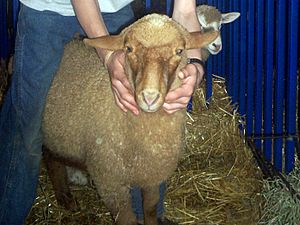American Tunis facts for kids

At the Maryland Sheep and Wool Festival in 2008
|
|
| Conservation status | FAO (2007): endangered Livestock Conservancy: watch |
|---|---|
| Other names | Tunis |
| Country of origin | United States |
| Standard | National Tunis Sheep Registry |
| Type | fat-tailed |
| Use | meat, wool |
| Traits | |
| Weight |
|
| Wool color | white |
| Face color | red |
| Horn status | hornless in both sexes |
|
|
The American Tunis is a special kind of sheep from the United States. It's known for having a fat tail! This breed is considered endangered, meaning there aren't many of them left. These sheep first came to America from Tunisia in 1799. People mostly raise them for their meat.
Contents
History of the American Tunis Sheep
How Tunis Sheep Came to America
The story of the American Tunis sheep began in 1799. The ruler of Tunis, named Hammuda ibn Ali, sent ten special sheep as a gift. These sheep were for George Washington, who was the first President of the United States.
Only two of these sheep made it to America. They arrived at the farm of Richard Peters in Pennsylvania. Richard Peters was an important person in early American history.
Spreading Across the Country
Richard Peters shared his Tunis rams (male sheep) for breeding. This helped the breed slowly spread to other farms. Many important people wrote about these sheep. This included John Adams and Thomas Jefferson, who both became presidents.
In the early 1900s, Charles Roundtree was a key person for the breed. He was the secretary of the American Tunis Sheep Breeders Association.
A Difficult Time for the Breed
The Tunis sheep became very popular for meat in the Mid-Atlantic and Upper South regions. But during the American Civil War, almost all of them disappeared. It was a very hard time for the breed.
After the war, Tunis sheep were mostly found in New England and the Great Lakes region. Later, some were moved to Indiana. There, they were sometimes bred with Southdown sheep.
Protecting the Breed Today
In 1896, a group called the American Tunis Sheep Breeders Association was formed. This group helps protect and promote the breed.
Today, the Livestock Conservancy lists the Tunis sheep as "watch." This means they are still keeping an eye on the breed to make sure it doesn't disappear. The Tunis sheep has also been added to the Slow Food Ark of Taste. This helps celebrate and protect unique foods and breeds.
 | Bayard Rustin |
 | Jeannette Carter |
 | Jeremiah A. Brown |

